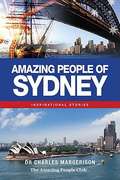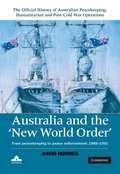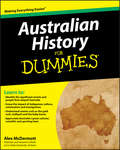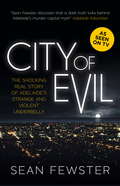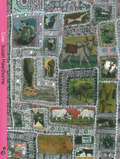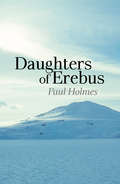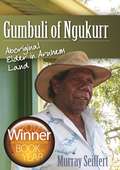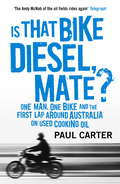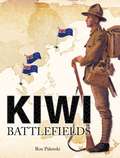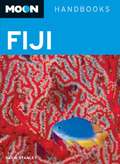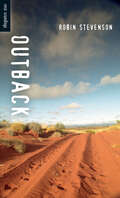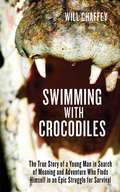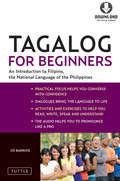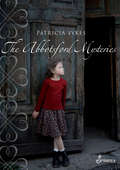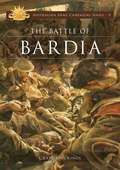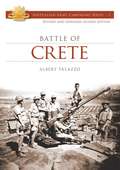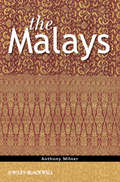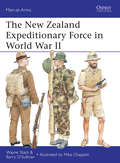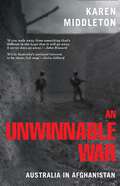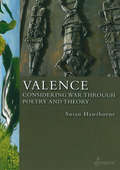- Table View
- List View
Amazing People of Sydney
by Charles MargerisonImagine you had to sail 10,000 miles to an island in the South Pacific Ocean in an old wooden boat. In 1788, that happened to over 1400 English convicts, colonists, captains and men of the Marine Corps. Watched by fearful local Aboriginals, they established a base in a place called New South Wales, Australia. Who were these amazing people? How did they survive and build the great and beautiful city that we now call Sydney? A city tour unlike any other, Amazing People of Sydney brings you in touch with real people who have left us a legacy that we can explore. Travel through time and meet some of the amazing people who helped Sydney develop. Discover how Governor Arthur Phillip and Bennelong, the captured Aborigine, tried to build relations between the communities. Explore the lives of people including Francis Greenway, Mary Reibey and George Howe. All of them arrived in Sydney as convicts and through their tenacious spirit, grew to become some of the most significant figures in the city. Find out about William Tom's discovery of gold, and Captain Thunderbolt's great escape from Cockatoo Island. Be moved by the outstanding work of the tireless humanitarian, Caroline Chisholm, and her work with young women. Discover how Banjo Paterson wrote Waltzing Matilda. These stories, and many others, come alive through BioViews®. What is a BioView®? A BioView® is a short biographical story, similar to an interview. These unique stories provide an easy way of learning about amazing people who made major contributions and changed our world.
Australia and the New World Order
by David HornerThis volume of the Official History of Australian Peacekeeping, Humanitarian and Post-Cold War Operations is the first comprehensive study of Australia's role in the peacekeeping and peace enforcement operations that developed at the end of the Cold War. It recounts vital missions including Namibia (1989-90), Iran (1988-90) and Pakistan/Afghanistan (1989-93), and focuses primarily on Australia's reaction to Iraq's invasion of Kuwait in 1990, including its maritime interception operations, and its controversial participation in the 1991 Gulf War. With exclusive access to Australian Government records and through extensive interviews, David Horner explains the high-level political background to these activities and analyses the conduct of the missions. He brings to life the little-known, yet remarkable stories of many individuals who took part. This is an authoritative and compelling history of how members of the Australian Defence Force engaged with the world at a crucial time in international affairs.
Australian History for Dummies (For Dummies Ser.)
by Alex McDermottCreated especially for the Australian customer! Exciting and informative history of the land down under Australian History For Dummies is your tour guide through the important events of Australia's past, introducing you to the people and events that have shaped modern Australia. Be there as British colonists explore Australia's harsh terrain with varying degrees of success. In this informative guide you'll Find out about Australia's infamous bushrangers Learn how the discovery of gold caused a tidal wave of immigration from all over the world Understand how Australia took two steps forward to become a nation in its own right in 1901, and two steps back when the government was dismissed by the Crown in 1975 Discover the fascinating details that made Australia the country it is today!
City of Evil: The Truth About Adelaide's Strange and Violent Underbelly
by Sean Fewster'Sean Fewster discovers that a dark truth lurks behind Adelaide's murder capital myth' - Adelaide AdvertiserThey call Adelaide the `city of churches?. What they forget is that every church has a graveyard -- and every graveyard is full of skeletons.Adelaide, an elegantly designed, civilised city, where the inhabitants are known for their love of the arts, good food and fine wine, is also the place where many of Australia?s most bizarre and macabre crimes have taken place. The cases in this book show that Adelaide truly does have another side: from the murder of a transvestite, pro-wrestling truck driver by his two lesbian lodgers (who worked as prostitutes) during an argument over a camera; to the prosecution of an elderly couple by the RSPCA for keeping, in frightful conditions and almost starved to death, a collection of 120 stray dogs and six pigs. This book is more than a collection of some of the most attention-grabbing, shocking and puzzling cases from the past ten years: it also looks at why it might be that so many have happened in this sunny, conservative, unassuming state capital. 'a collection of macabre murders, rapes, torture and robbery, all occurring in Adelaide, the "City of Churches"...sensational and gruesome' - Courier Mail'This book is not for the squeamish, but if you love true crime stories then this is right up there with the best of them' - Toowoomba Chronicle
Cow
by Susan HawthorneAn intriguing approach to the rewriting of myth, this poetry collection journeys through the history of languages and symbolic traditions. Through main character Queenie, a cow of many abilities, these poems delve into the creation of the universe as Queenie fashions the galaxies and travels through the sky as a herd of stars. Delightful and surprising, this compilation draws on the Greek lyric tradition of Sappho as well as on South India's Sangam poetry tradition to provide a balanced work of both humor and melancholy.
Daughters of Erebus
by Paul HolmesHow 287 people died in the air crash on Mt Erebus. What caused the crash and who covered it up
Gumbuli of Ngukurr: Aboriginal elder in Arnhem Land
by Murray SeiffertTwo stories overlap and interweave in this biography of Gumbuli of Ngukurr. One is of a remarkable Aboriginal elder, Michael Gumbuli Wurramara, whose early life was spent on remote islands in the Gulf of Carpentaria. As a teenager, he moved to the historic Roper River Mission, which became known as Ngukurr when the government took over its control. Gumbuli was one of the community leaders who fought hard to achieve local decision-making at this time of dramatic change. Later he became the first Aboriginal Anglican priest in the Northern Territory and for over 30 years, leader of the Arnhem Land Anglicans and 'architect' of the Kriol Bible Translation Project. He faced many of the challenging issues arising from traditional Aboriginal ways meeting Western culture and the Christian faith. The second story describes the Ngukurr community in the second half of the twentieth century, as it seeks to achieve a mix of ancient and modern cultures. Along the way, issues arise such as health, employment, economics, welfare, Stolen Generation, polygamy, alcohol and Aboriginal spirituality. The plea of 'Why don't you ask us?' seems to fall on deaf ears in each generation. Extremely readable and thought-provoking, this work is based on extensive interviews, observation and archival research. It challenges many assumptions about the relationships between government, missions and Aborigines. A collection of photographs, many of historical importance, accompanies the text.
How Australia Decides
by Sally YoungIn recent years, the Australian media have come under fire for their reporting of politics and election campaigns. Political reporting is said to be too influenced by commercial concerns, too obsessed with gossip and scandal, and too focused on trivia and 'sound bites' at the expense of serious issues. There are accusations of bias, sensationalism, 'lazy' journalism and 'horse-race' reporting that is obsessed with opinion polls. How Australia Decides is the first book to put these allegations to the test. Based on a four-year empirical study, Sally Young reports the results of the only systematic, historical and in-depth analysis of Australian election reporting. This groundbreaking book shows how election reporting has changed over time, and how political news audiences, news production and shifts in political campaigning are influencing media content, Ai with profound implications for Australian democracy.
Is that Bike Diesel, Mate?: One Man, One Bike, and the First Lap Around Australia on Used Cooking Oil
by Paul CarterOi, mate, is that monstrosity diesel? From the author of the bestsellers Don't Tell Mum I Work on the Rigs, She Thinks I'm a Piano Player in a Whorehouse and This Is Not a Drill, this is the eagerly awaited next installment of Paul Carter's rollicking life.Take one mad adventurer and a motorbike that runs on bio fuel (cooking oil i.e. chip fat to you and me) and send them with one filmmaker on a road trip around Australia just to see what happens. What you get is a story full of outback characters, implausible (but true) situations, unlikely events and unfortunate breakdowns, all at a break neck pace. Never one to sit still for long, this is what Paul Carter did next.Whether you've been shocked, delighted, entertained, horrified - or all of the above - by Paul's stories whether from oil rigs or the road one thing is for sure, they are always high octane adventures.
Kiwi Battlefields
by Ron PalenskiThe history behind the major battlefields in which New Zealand soldiers fought
Labor'S Conflict
by Tom Bramble Rick KuhnOnce widely regarded as the workers greatest hope for a better world, the ALP today would rather project itself as a responsible manager of Australian capitalism. Labor's Conflict provides an insightful account of the transformations in the Party's policies, performance and structures since its formation. Seasoned political analysts, Tom Bramble and Rick Kuhn offer an incisive appraisal of the Party's successes and failures, betrayals and electoral triumphs in terms of its competing ties with bosses and workers. The early chapters outline diverse approaches to understanding the nature of the Party and then assess the ALP's evolution in response to major social upheavals and events, from the strikes of the 1890s, through two World Wars, the Great Depression, and the post-war boom. The records of the Whitlam, Hawke, Keating, Rudd and Gillard governments are then dissected in detail. The compelling conclusion offers alternatives to the Australian Labor Party, for those interested in progressive change.
Lusting for London
by Peter MortonThis book examines the flight of young Australian writers to London in the decades before and after Federation in 1901. Peter Morton studies how their careers were shaped by shifting their country of residence, the expatriate experience, and how the loss of these expatriates affected the evolving literary culture of Australia.
Moon Fiji
by David StanleySouth Pacific expert and veteran travel writer David Stanley knows the best way to experience Fiji, from making the most of one of the world's premiere diving spots to getting away from it all in lesser-known villages. David provides great trip ideas for a variety of travelers, such as Best of Fiji, Island-Hopper Special, and The Life Aquatic. Packed with information on swimming the reefs, taking day-long boat cruises, and sampling Fijian specialties, Moon Fiji gives travelers the tools they need to create a more personal and memorable experience.
Outback: (outback) (Orca Soundings)
by Robin StevensonSince his girlfriend dumped him, Jayden has been avoiding school-and life in general. When his eccentric uncle Mel invites him to help with his biology research at an Australian university, he figures he has nothing to lose. Once he arrives, he discovers Mel is obsessed with finding a new species of lizard and is determined to be the first to discover it. Unfortunately, this means an expedition into the scorching desert heat of the Australian outback...with the increasingly paranoid Mel and an unfriendly biology student named Natalie. Then disaster strikes, and Jayden and Nat find themselves many miles from civilization fighting for their survival. Also available in Spanish.
Swimming with Crocodiles: The True Story of a Young Man in Search of Meaning and Adventure Who Finds Himself in an Epic Struggle for Survival
by Will ChaffeyIn the tradition of Into the Wild, here is the riveting story of a young man seeking his own truth and finding adventure in the awesome, unforgiving power of nature. Will Chaffey is eighteen when he boards a plane in New York bound for Australia. Taking time off to work and travel, Will meets an enigmatic wanderer and herpetologist. Together they cross the inland desert to the tropical northwest coast, home to the saltwater crocodile, a known man- eater and a predator who has been hunting since the age of the dinosaurs. They devise a plan to explore the remote Prince Regent River, a trek so dangerous it had never been attempted by outsiders. Passing through harsh, primeval country, shadowed by their own exhaustion, and physically worn down, they find themselves locked in a life-and-death struggle when their food runs out and, unable to leave, they are stalked by a hungry crocodile. Filled with scenes of great natural beauty, Swimming with Crocodiles is at once the affecting account of a journey into adulthood and a hair- raising epic of survival.
Tagalog for Beginners
by Joi BarriosThis is a straight-forward and user-friendly guide to the Tagalog language. Tagalog for Beginners is the book to help you learn Tagalog (Filipino) on your own, easily and accurately-whether you're traveling to the Philippines for a vacation or a business trip, or you have ties to the large Tagalog-speaking community in the U. S. , or you're simply a language lover. From the fascinating history of Philippines' language to how you speak it, join skilled teacher Barrios on a guided introduction-with a practical focus. After journeying through the carefully-paced explanations, conversations, cultural info, and activities in Tagalog for Beginners, learners will be able to use Tagalog (Filipino) in a wide range of common situations. From shopping for food to asking directions, from telling time to expressing how you feel, this book gives you the communication skills you need. The MP3 audio-CD helps reinforce pronunciation and improve listening comprehension. Helpful suggestions guide heritage learners (those of Filipino descent but born outside the Philippines) on how to use the book most effectively for their needs. Key features include:: An accompanying MP3 Audio CD. Realistic dialogues to bring the language to life. Activities and exercises to help you read, write, speak and understand. Notes on the Tagalog language and history. A special section guides native (heritage) learners and instructors on how to use the book most effectively for their needs.
Tagalog for Beginners
by Joi BarriosThis is a straight-forward and user-friendly guide to the Tagalog language.Tagalog for Beginners is the book to help you learn Tagalog (Filipino) on your own, easily and accurately-whether you're traveling to the Philippines for a vacation or a business trip, or you have ties to the large Tagalog-speaking community in the U.S., or you're simply a language lover.From the fascinating history of Philippines' language to how you speak it, join skilled teacher Barrios on a guided introduction-with a practical focus. After journeying through the carefully-paced explanations, conversations, cultural info, and activities in Tagalog for Beginners, learners will be able to use Tagalog (Filipino) in a wide range of common situations. From shopping for food to asking directions, from telling time to expressing how you feel, this book gives you the communication skills you need. The MP3 audio-CD helps reinforce pronunciation and improve listening comprehension.Helpful suggestions guide heritage learners (those of Filipino descent but born outside the Philippines) on how to use the book most effectively for their needs.Key features include:: An accompanying MP3 Audio CD. Realistic dialogues to bring the language to life. Activities and exercises to help you read, write, speak and understand. Notes on the Tagalog language and history. A special section guides native (heritage) learners and instructors on how to use the book most effectively for their needs.
Tagalog for Beginners
by Joi BarriosThis is a straight-forward and user-friendly guide to the Tagalog language.Tagalog for Beginners is the book to help you learn Tagalog (Filipino) on your own, easily and accurately-whether you're traveling to the Philippines for a vacation or a business trip, or you have ties to the large Tagalog-speaking community in the U.S., or you're simply a language lover.From the fascinating history of Philippines' language to how you speak it, join skilled teacher Barrios on a guided introduction-with a practical focus. After journeying through the carefully-paced explanations, conversations, cultural info, and activities in Tagalog for Beginners, learners will be able to use Tagalog (Filipino) in a wide range of common situations. From shopping for food to asking directions, from telling time to expressing how you feel, this book gives you the communication skills you need. The MP3 audio-CD helps reinforce pronunciation and improve listening comprehension.Helpful suggestions guide heritage learners (those of Filipino descent but born outside the Philippines) on how to use the book most effectively for their needs.Key features include:: An accompanying MP3 Audio CD. Realistic dialogues to bring the language to life. Activities and exercises to help you read, write, speak and understand. Notes on the Tagalog language and history. A special section guides native (heritage) learners and instructors on how to use the book most effectively for their needs.
The Abbotsford Mysteries
by Patricia SykesThe Abbotsford Convent becomes more than the setting of this poetry collection; it emerges as presence, intimate and familiar as well as constraining and forbidding. But, it is childhood itself that becomes the subterranean geography and pulse of this compilation as the poems explore what it means to grow up in an orphanage. Subject to the rules of lay and religious adults, the voices herein create multiple pathways through memory and time as they map and navigate the many-stranded mysteries of their institutionalized lives.
The Battle of Bardia (Australian Army Campaigns #9)
by Craig StockingsOn the morning of 3 January 1941, Australians of the 6th Division led an assault against the Italian colonial fortress village of Bardia in Libya, not far from the Egyptian-Libyan frontier. The ensuing battle was the second of the First Libyan Campaign, but the first battle of the Second World War planned and fought predominantly by Australians. The fortress fell to the attackers a little over two days after the attack began, in what could only be described as a remarkable victory. At a cost of 130 killed and 326 wounded, the 6th Division captured around 40,000 Italian prisoners and very large quantities of military stores and equipment. The victory was heralded at the time in Australia as one of the greatest military achievements of that nation's military history. Quite soon afterwards, however, overshadowed perhaps by Rommel's subsequent desert advances, the tragedy in Greece, and the war in the Pacific, Bardia slipped from the public mind. Very few Australians today have heard of the battle. This book attempts to bring Bardia back into the light.
The Battle of Crete (Australian Army Campaigns #1)
by Albert PalazzoBetween 20 May and 1 June 1941 the Second World War came to the Greek island of Crete. The Commonwealth defenders consisted of Australian, New Zealand and British refugees from the doomed Greek Campaign who had not recovered from defeat.
The Malays (The Peoples of South-East Asia and the Pacific #4)
by Anthony MilnerJust who are ‘the Malays’? This provocative study poses the question and considers how and why the answers have changed over time, and from one region to another. Anthony Milner develops a sustained argument about ethnicity and identity in an historical, ‘Malay’ context. The Malays is a comprehensive examination of the origins and development of Malay identity, ethnicity, and consciousness over the past five centuries. Covers the political, economic, and cultural development of the Malays Explores the Malay presence in Brunei, Singapore, Indonesia, Thailand, Cambodia, Sri Lanka, and South Africa, as well as the modern Malay show-state of Malaysia Offers diplomatic speculation about ways Malay ethnicity will develop and be challenged in the future
The New Zealand Expeditionary Force in World War I
by Mike Chappell Wayne StackAlthough comparatively small in number, the New Zealand Expeditionary Force in World War I (1914-1918) earned an elite reputation on the Western Front, and the New Zealanders' war effort was a defining moment in their national history and sense of identity. The statistics are astonishing: of the total population of New Zealand of 1 million, no fewer than 100,000 men enlisted - that is one in every five men in the country, and of those, 18,000 men were killed and 58,000 wounded. In other words, 15 per cent of the male population of New Zealand became casualties. The NZEF was first committed at Gallipoli in 1915, NZ cavalry regiments helped defend Egypt and fought in Palestine with Allenby's famous Desert Mounted Corps; on the Western Front the Kiwis were called the 'Silent Division' for their fieldcraft and their uncomplaining professionalism. This book is both a tribute and a history of the crucial contribution made by a small nation.From the Trade Paperback edition.
Unwinnable War: Australia In Afghanistan
by Karen MiddletonA decade on from the 2001 terrorist attacks on the United States, Australians are embroiled in one of the nation's longest military conflict-the war in Afghanistan. An Unwinnable War charts the motives, ambitions and negotiations that carried Australia into Afghanistan: from the then Prime Minister John Howard's presence in Washington DC on September 11, 2001 to the 'transition' plan to hand security to Afghan forces - all played out in the wake of increasing casualties. Based on interviews with key political and military figures in Australia and abroad, An Unwinnable War lays bare the tensions between political and military decision-making, the nature and potency of the US alliance and the influence of individual personalities in charting Australia's course in what was once dubbed the 'good war'.
Valence: Considering War through Poetry and Theory
by Susan HawthorneValence in chemistry, the number of bonds in an element's atom in linguistics, the number of arguments controlled by a verbal predicate in psychology, the emotional charge something has In this remarkable annotated poem, Susan Hawthorne commits to words the horrors of war that have been left unspoken. She shatters the conspiracy of silence and dares to draw links between militarism, fundamentalism and the sex industry. She rails against the violence of war and contemplates the link between place and the history of war that is infused into the earth. With a fresh examination of her surroundings, she considers the endless cycle of war that survives on the persistence of hope--hope of an end to war, hope of an end to suffering. This is a hope that Susan Hawthorne does not ultimately share, but her courage in telling the truth about war through her poetry is a gift for readers.
